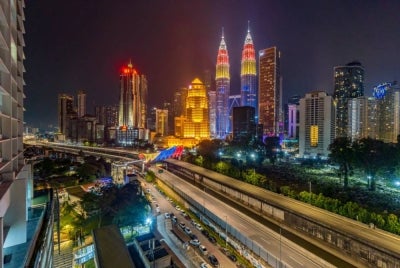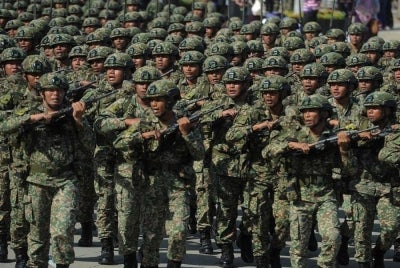Profit over people: How economic interests enable genocide in Gaza and beyond
While the world has made rhetorical commitments to "never again" after events like the Holocaust and the Rwandan genocide, the reality is that economic alliances, trade dependencies and geopolitical calculations often override the moral imperative to act.
MOHD NAZARI ISMAIL
In the modern global order, the prioritisation of economic interests over human rights has repeatedly led to the passive acceptance, or in some cases, active enablement of human rights abuses and atrocities, including genocide.
While the world has made rhetorical commitments to "never again" after events like the Holocaust and the Rwandan genocide, the reality is that economic alliances, trade dependencies and geopolitical calculations often override the moral imperative to act.
When economic considerations take precedence, the political will to prevent or stop genocide erodes, and states become complicit in silence.
One example of this reality was the international response to the Rwandan genocide in 1994. During this tragic period, the international community failed to intervene decisively, partly due to the region's perceived lack of strategic or economic interest.
As a result, more than 800,000 Tutsi and many moderate Hutus were massacred. The violence caused a major humanitarian crisis that continues to affect the region.
The international community's failure to intervene and stop the violence continues to leave a stain on the reputation of UN Peacekeeping today.
Another example is the ongoing human rights abuses of the Muslim Uyghur population in China's Xinjiang region, which some parties have described as genocide.
Despite extensive documentation of forced labour, mass internment, and cultural erasure, many governments and corporations have hesitated to take meaningful action.
This reluctance is rooted in China's vast economic power and critical role in global supply chains. Sanctions or boycotts risk disrupting trade, harming multinational profits or straining diplomatic relations.
As a result, condemnations tend to be symbolic rather than substantive, enabling the persecution to persist largely unchecked.
That is possibly the reason even some Muslim countries, including Malaysia, are largely silent on the issue of the Uighur.
In the case of Malaysia, the most likely explanation for this silence is the country's strong economic ties with China.
In 2023, Malaysia's total exports to China were valued at US$79.8 billion, making China the top destination for Malaysian exports.
In 2024, Malaysia approved investments of RM 55.4 billion (US$12.5 billion) from China, accounting for 33.9 per cent of the total.
In 2023, China ranked among Malaysia's top five foreign investors, driven by the manufacturing and services sectors.
Any diplomatic spat with China can result in severe economic outcomes for the country. The Malaysian government is keen to avoid that.
But possibly the clearest example is the ongoing genocide in Gaza. Since October 2023, Israel has carried out relentless bombings on civilian infrastructures in Gaza, including schools, mosques, universities, hospitals and even United Nations relief centres.
Nowhere is safe for the Gazans.
More than 60,000 Palestinians have been murdered by the Israeli military, including women and children.
Every day, there will be news reports of Palestinian women and children being bombed to pieces by Israel.
Various organisations and human rights experts, including scholars on genocide, have attested to the fact that Israel is now committing the crime of genocide and ethnic cleansing in Gaza.
Unfortunately, the structure of the UN, which gives veto power to the United States, one of the five permanent members of the UN Security Council, has resulted in the UN being completely powerless to stop Israel from continuing to carry out its murderous bombings in Gaza as long as the US decides that it is OK for Israel to do so.
However, countries could still take action to punish Israel for its crimes by breaking off diplomatic and trade relations with Israel.
A global boycott of Israel is now an obligation on the international community.
Since the international community was able to sever ties with South Africa before when there was an apartheid regime in power there, there is no reason why it cannot be the same in the case of Israel, especially since the International Criminal Court (ICC) has already issued arrest warrants for two senior Israeli officials, Benjamin Netanyahu, the current Prime Minister of Israel, and Yoav Gallant, the former Israel Defense Minister.
In addition, governments can take steps to sever any trade relations with organisations listed in the Office of the UN High Commissioner for Human Rights statement on June 20, 2024, as being involved in human rights abuses in Gaza.
These companies include BAE Systems, Boeing, Caterpillar, General Dynamics, Lockheed Martin, and Northrop Grumman. Other companies that are not mentioned but are well known to collaborate with Israel include Microsoft, Dell, and Hewlett-Packard.
Moreover, since the Office of the UN High Commissioner for Human Rights has also listed some financial institutions as supporting human rights abuses in Gaza through their investment activities, governments can also warn these companies that their activities will be restricted in the future if they continue to invest in companies that commit human rights abuses in Gaza.
Unfortunately, many governments, including Muslim countries, are not only unwilling to break off trade and diplomatic relations with Israel, but they are also reluctant to take action against companies that are complicit with Israel in committing human rights violations against the Palestinians.
Some, such as Jordan and Egypt, depend on the US government for financial and military aid. Some others, such as Sudan and some African nations, are highly indebted to the IMF, an institution under the control of the United States.
Others are not so highly indebted and also not dependent on financial and military aid. Nevertheless, they rely on the US as a market for their exports.
Their primary consideration is the possible negative repercussions to their economies. Many countries are scared of the wrath of the United States if they boycott Israel or boycott companies that are complicit with Israel.
This worry has increased since Donald Trump became the US president because of his readiness to impose punitive tariffs on countries that he considers to be acting against the interests of the United States.
This lack of response to the ongoing genocide, whether in China or Palestine, poses a profound challenge to the credibility of international human rights frameworks.
If economic pragmatism consistently outweighs moral obligation, then the prevention of genocide becomes conditional and selective.
To reverse this trend, the international community must establish and enforce mechanisms that prioritise human rights independently of economic gain through legal accountability, transparent trade policies, and civil society pressure.
Governments must also be willing to take the risk of some possible negative economic consequences as a result of their stance to confront genocidal regimes and their supporters.
Ultimately, nations must prioritise the principle of human rights over profit. Only by doing so will they send a message that the lives of marginalised populations are not negotiable.
The lack of political will to confront genocidal regimes and the unwillingness to undertake economic sacrifices to stop their impunity will mean that we are telling the future generation that the world is only willing to condemn genocide with words. But when it comes to actual actions, that will depend on whether our wallets will be affected.
Emeritus Professor Mohd Nazari Ismail is the director of Hashim Sani Centre for Palestine Studies at Business and Economics Faculty of Universiti Malaya. The opinions expressed in this article belong solely to the authors and do not necessarily represent the views of Sinar Daily.
Download Sinar Daily application.Click Here!














